Why Does My Dog Hide Under the Bed? 5 Vet-Reviewed Possible Reasons & Tips

Updated on
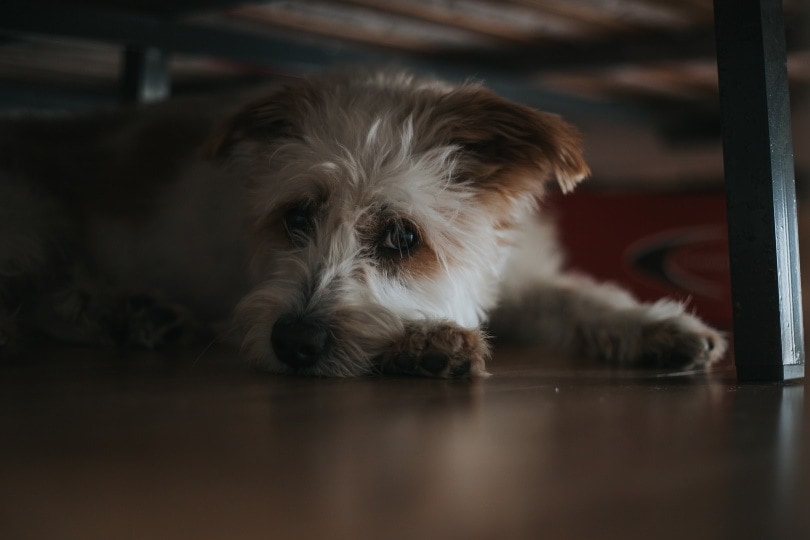
If your dog is hiding under your bed again, and you’re wondering why, you’ve come to the right place. This is common behavior for many dogs, so we’ll look at some of the possible reasons and whether you should be concerned.
For one thing, your bed offers a dark, safe, and cozy spot that provides a sanctuary from anything that might be stressing them out.
The 5 Reasons Your Dog Is Hiding Under the Bed
1. Changes in the Home
Your dog is a creature of habit, so when things change in their routine and environment, they might seek refuge under your bed. Perhaps you’re having people over, and there’s a lot of noise. Your dog might just need a break, and hiding under your bed will give him some peace until things go back to normal.
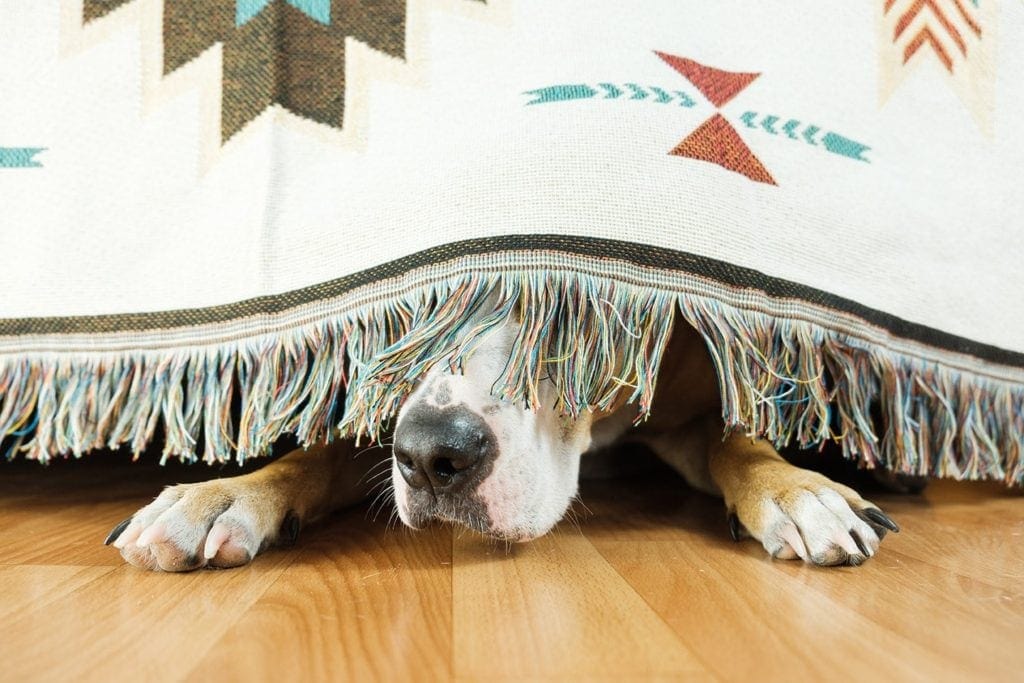
2. Fear
If something makes your dog afraid, such as sudden loud noises like fireworks, thunder, or an annoying noisy motorcycle roaring past your house, seeking a safe and quiet spot under your bed is something that your dog might do regularly.
3. Pure Enjoyment
Your dog may just find hanging out under your bed a particularly enjoyable thing to do. It’s quiet, dark, and cozy. They might just want to hang out and relax, just like you do in your favorite chair.
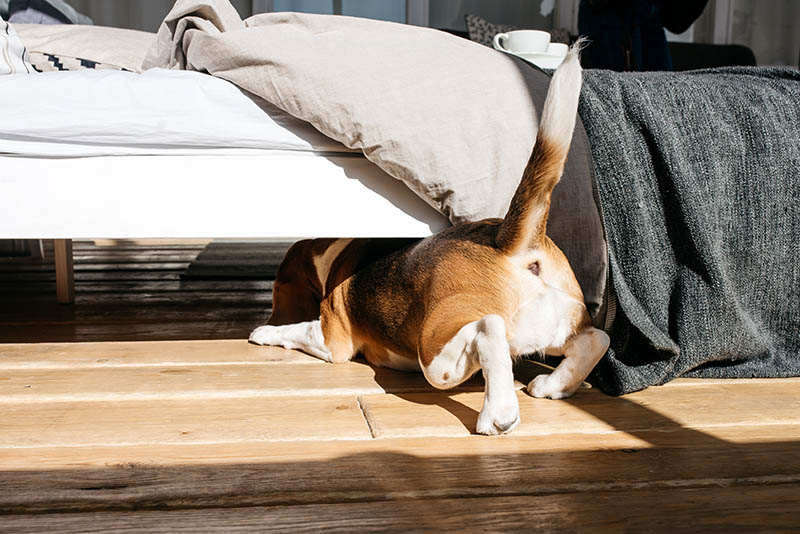
4. Hiding Something Forbidden
Your dog has managed to grab something that they know they shouldn’t have, but it’s too good to pass up. So, they’ll run under your bed to keep out of your reach and enjoy their unexpected treat.
5. Injury or Illness
If your dog isn’t feeling well or is injured, they might seek out shelter as a way to cope with pain or illness. If your dog is acting differently, particularly if they don’t usually hide under your bed, check them for illness or possible injuries. Take them to your vet as soon as possible if you suspect either possibility.
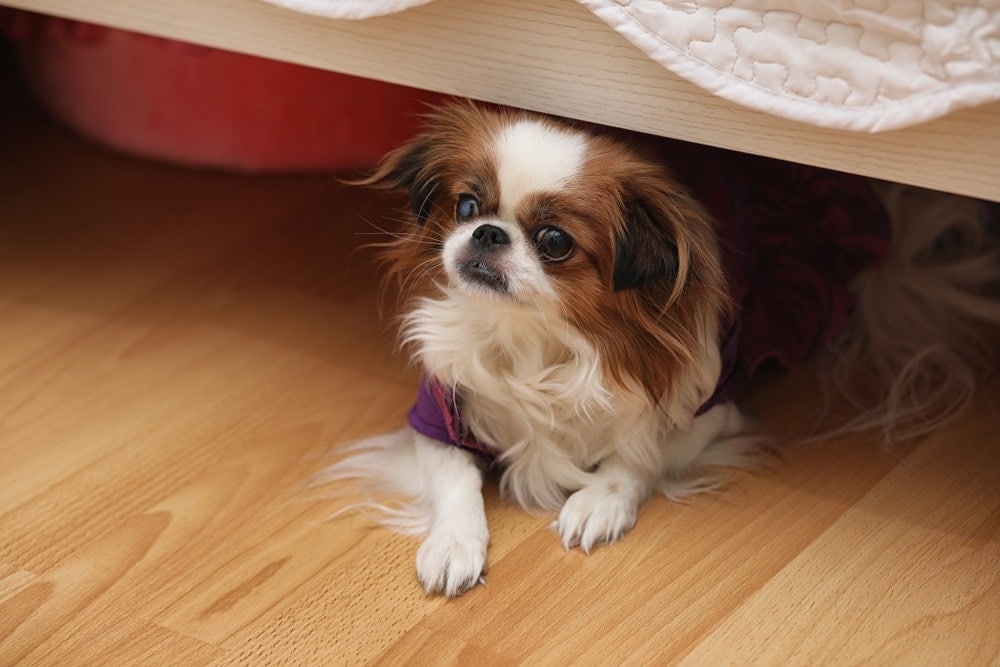
Tips to Help Prevent Your Dog From Going Under Your Bed
If you have visited the vet and ruled out that the reason for this behavior is that they are sick, you can work on the behavior. If you would prefer that your dog doesn’t hide under your bed, here are some tips to ensure that they won’t gravitate to your bed, at least as often.
A New Space
If you create a designated and similarly safe space, your dog might seek it out instead of constantly going under your bed. If you don’t have a dog crate already, consider purchasing one. If you already have a crate, you can buy a crate cover or drape some blankets over it.
There are soft dog crates that can create a cozy, den-like atmosphere. They also have the advantage of being collapsible for easy storage and the ability to travel with your dog.

Aids to Assist With Stress Reduction
You can train your dog and help acclimatize them to a stressful environment. There are a variety of methods that can help your dog deal with their fear of loud noises.
You can also purchase various products such as a ThunderShirt, calming supplements, and Rescue Remedy, which are all meant to help calm your dog naturally.
Desensitization
Some experts suggest playing the sounds of thunder and fireworks at low volume and very gradually raising the volume over days and weeks. If the dog remains calm, give them praise and treats to help them become desensitized to these sounds.
You can also work on distracting your dog during storms or fireworks. Put on some music or white noise to help cover some of the loud noises, and distract them by playing with them. However, don’t force them to play if they would rather hide. You need to show them love and patience and not add to any of their stress.
If you’re worried about your dog’s anxiety, you can speak to your veterinarian about the available options.
Signs of Stress
In order to have a better understanding of why your dog is hiding under your bed, you should recognize the signs of stress that they might exhibit.
- Being able to see the whites of their eyes
- Tail and ears tucked in
- Excessive licking of their chops and drooling
- Raised hackles
- Panting and excessive yawning
- Growling for no reason
- Stiffness and freezing
- Pacing back and forth
- Barking and whining for no apparent reason
- Shaking and trying to hide
Of course, you know your dog best, and if your dog is acting out of character and you’ve ruled out any medical issues, you can help your dog deal with their stress constructively. Allowing your dog to have time in a quiet place when you have no control over the loud noises might be the best solution. You can also talk to your vet or a dog trainer about how to best help your dog.
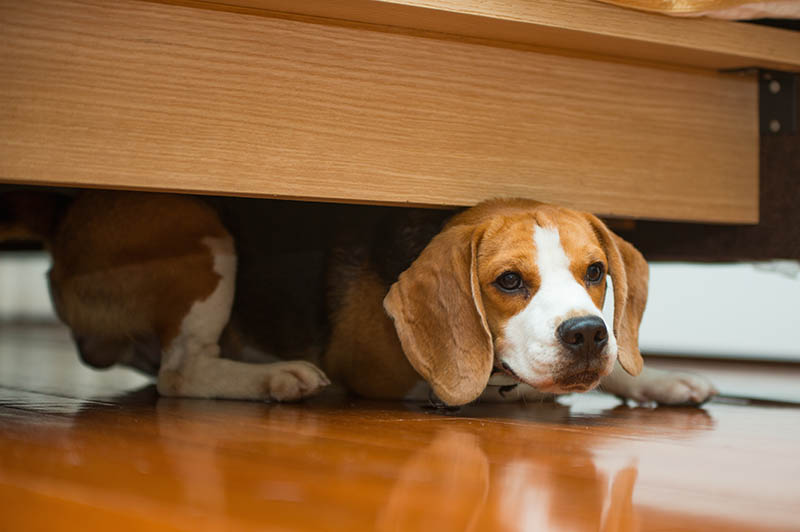
What Not to Do for Dogs That Hide Under Beds
Humans need kindness, love, and patience when feeling afraid and stressed, and dogs are no different.
When your dog is under your bed, you should not pet them, reassure them, or feed them treats at that moment, or you’ll be essentially rewarding them for their current fearful behavior. That said, you should not punish or yell at them, as that will only add to their fear and make the situation worse.
On the other hand, you should not punish or yell at him as that will only add to his fear and make the situation worse. You need to act as normally as possible and talk to or play with your dog like everything is business as usual.
Why Does My Dog Sleep Under the Bed?
If your dog prefers to sleep under your bed instead of on your face, consider yourself lucky. But perhaps your dog is sleeping under there because they simply enjoy it. Dogs are considered den animals because their wild ancestors would sleep in small, enclosed spaces. Your dog is just tapping into their roots and enjoying being near you in a safe environment.
Conclusion
The overall takeaway from this should be that if your dog seems anxious, fearful, or stressed, you should follow some of these steps. You want your dog to be healthy and happy all of the time. If you are ever concerned about your dog’s behavior or health, consult your vet.
Your dog may have multiple reasons for running under your bed, but there are numerous resources at your fingertips. Always treat your dog with love, and try not to get frustrated with them. You do not want to be part of the source of your dog’s stress. Your dog is a sensitive and perceptive animal and a part of your family. Your job is to ensure that they are happy and to provide them with the most amazing life possible.
See also:
- How to Calm a Dog During Fireworks: 10 Vet-Reviewed Tips
- Is Dog Crate Training at Night Cruel? Tips, Facts & Advice
Featured Image Credit: Paulo A. Sousa, Shutterstock













